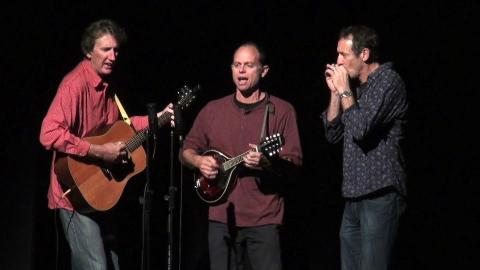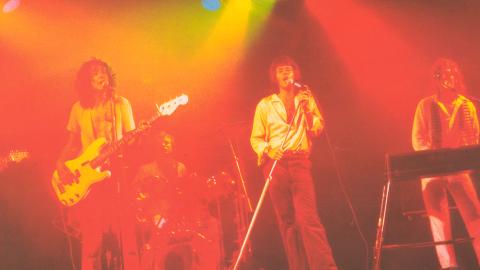

Cooee Cabaret in Warrnambool
Shane Howard, of the classic Aussie band Goanna, will tonight perform one of the band’s biggest hits ‘Solid Rock’ for the people of Warrnambool. Shane will play at Cooee Cabaret — the NFSA’s touring vaudeville-style show which incorporates the Archive’s Sounds of Australia Registry.
‘Solid Rock’ is widely recognised as one of the most of the most significant songs in contemporary music. Nominations are open for the 2011 register — what sounds do you think should be added?
Shane shares his thoughts on the success of ‘Solid Rock’ in a Q&A below.
Solid Rock (Remastered Version) - Goanna (2003).
Did your early years singing at mass, and with your mother playing the organ, influence your style of music today?
Definitely. It was the first and repeated contact with music and harmony and a tonal sense. I think so much of that influence was subliminal and pervasive. The voicings, the sense of tonality and close harmony, all seeped in.
Can you describe the feeling you had when you first experienced the Australian Outback and the spirituality of that land?
Where I grew up, in south west Victoria, the landscape had been well and truly altered and tampered with, since colonisation. My Dad had a great love of nature and the bush. He would often take us to the Framlingham forest or the Grampians, where you could get a sense of a natural or native landscape. He called the bush, ‘Nature’s cathedral’. I first went to central Australia, to Uluru, in 1981. Central Australia was relatively untouched. You can get a clear sense of native landscape. It’s also visually uncomplicated. I think it’s true that you can think as far as you can see, so it’s possible to think big thoughts in a big landscape. There is a timeless and unconquerable sense to a desert landscape. It’s tough but fragile country. You have to work in harmony with it, or you’ll perish. I remember being out West of Alice Springs and driving off road for a long way until there was no sign of man. You get a very clear idea of your insignificance in that sense of vastness and an understanding of how important it is to have an intimate, spiritual, relationship with country. It’s one thing to be ‘on’ country, it’s another thing altogether to be ‘in’ country.
How did it influence your music and the direction of your career?
Everything changed for me after my early experiences at Uluru. How I saw the landscape, how I saw Aboriginal people, how the land was full of song and songlines and story, drama, history, sacred lore and mythology. It was a cultural awakening as well as a political awakening. It propelled me into Aboriginal Australia and a lifetime of relationships, right across the country, that still continue.
Paul Kelly and Kev Carmody wrote 'From Little Things Big Things Grow' while sitting under the stars, by a campfire in the Outback. The landscape has an enormous impact on people. How did it inspire ‘Solid Rock’ (1982)?
After I’d been walking the country around Uluru for a few days, back in May 1981, I noticed a small hand written note stuck to the wall of the toilet and shower block. “Inma. Other side of the rock. Sunset.” (Inma is dance and song, a corroboree). I walked the several kilometres to the western end of the rock, arriving just before sundown. There weren’t many whitefellas there, but there was a large group of Aboriginal people from Amata in the Musgrave Ranges. As night fell, the singers began chanting and the clapsticks rang out across the desert as it descended into darkness. The traditional dancers appeared in the circle of fires, painted with ochre, to tell the story of the Seven Sisters. In the firelight, they looked more like spirits than humans. At the very moment the inma began, the full moon rose from behind the dark silhouetted form of that ancient monolith. It was a transforming experience for me, a wake up call to the deep intelligence at work in that simple but powerful choreographed moment. I began to understand the deep sacredness and connectedness of Aboriginal people to their homelands. I ‘woke up’ in the Dreaming. Maybe I found something that I was looking for but the experience also changed everything about my understanding of Australia and what was really at the heart of life for Aboriginal people.
What did you set out to achieve by recording ‘Solid Rock’?
I wanted to shift perceptions in Australia. I wanted to shine a light on the injustice and racism and the way Australia had become a nation in denial of its history. What W.E.H. Stanner called ‘the cult of forgetfulness’ that had developed in Australia. I wanted people to care and understand the dreadful injustices at work in Australia for Aboriginal people. It was so obvious, but few people gave it a second thought. I knew that as a band we would also have to make compromises to penetrate into the marketing machinery of the music industry world. So we set out to make the best sounding recording we could and we negotiated a recording contract with Warner Brothers.
What was it like being invited to perform at Kevin Rudd’s 2008 Apology concert, alongside some of the nation’s most influential musicians — Archie Roach, Ruby Hunter and Dan Sultan?
It was one of those very powerful moments in your life. Archie’s evocative song, ‘Took The Children Away’, gave voice to the Stolen Generations all those years ago. It was the song for that moment of the Apology and it was an emotionally overwhelming experience to sing with Archie and Ruby on that day. At the end of the song the thousands of people in attendance rose as one and applauded. The applause just went on and on until it felt like it was never going to stop. Archie surveyed the audience, overwhelmed by the response and the feelings and the faces and broke down. There was a huge emotional outpouring and release in that moment. The relief and the healing was palpable.
You have just come back from touring with Neil Murray. What do you admire in his work?
Neil’s songs and writings speak to me about Australia in a way that few other Australian artists do. Particularly as a non Aboriginal artist. The loss and the longing, the need for those of us, as migrant Australians, to understand this Aboriginal country and create a new way to belong here. Neil’s out there boundary riding the future and he’s never opted for the easy road. The hard edged reality of life on the fringes as well as the poetic grandeur of the landscape is all there in his powerful body of work. Neil and I are from south west Victoria, so we share a strong sense of parallel journeys.
‘From Little Things Big Things Grow’ was added to the Sounds of Australia Registry this year alongside Tex Morton, Daddy Cool, Paul Keating and Oodgeroo Noonuccal (amongst others). Who inspires you the most and why?
I’ve been inspired by people like Manning Clark, Henry Lawson, Michael Dransfield, John Shaw Neilson, John O’Donohue, Early Irish Poetry, Patrick Kavanagh, W.B. Yeats, Oodgeroo of the Tribe Noonuccal, Custodian of the Land Minjerribah, William Shakespeare, Bob Dylan, Victor Jara, Clancey McKenna and Dooley Bin Bin and Don McLeod, Vincent Lingiari, Paddy Roe, Teilhard de Chardin, Aboriginal Dreaming stories, The Bible, (Old and New), the Qu’uran, the Sufi poets, Rumi and Hafez, Nelson Mandela and so many more.
Is it time for ‘Solid Rock’ to be part of the Sounds of Australia Registry? Why?
I do think it’s appropriate 30 years later. The song has proved enduring and has served as a conduit and a bridge between both Aboriginal and non Aboriginal people. It’s also crossed generations now. I receive so many cover versions of the song from a broad cross section of artists, many of whom are of a new generation.
The National Film and Sound Archive of Australia acknowledges Australia’s Aboriginal and Torres Strait Islander peoples as the Traditional Custodians of the land on which we work and live and gives respect to their Elders both past and present.


